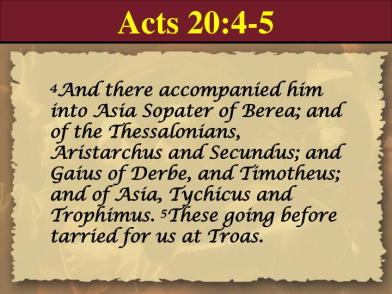By
Shelby G. Floyd
Good morning church! It is good to be together. We are thankful for all our dedicated members at Heartland.
Today I speak to you on “Breaking Bread Together.” We read Acts 2:36-42 in our Bibles. This reading described how sinners were saved and how they worshipped on the birthday of the church of Christ. They worshipped on the day of Pentecost (always the first day of the week) by continuing “…steadfastly in the apostles’ doctrine and fellowship, in the breaking of bread, and in prayers” (Acts 2:42). “The breaking of bread” is a reference to “the Lord’s Supper.” This was practiced every “first day of the week!”
PAUL AND FELLOW WORKERS TRAVEL BY SHIP TO TROAS
But my lesson today is on what happened on “the first day of the week” in Troas, Asia (Acts 20:1-12)! Paul is on his second evangelistic journey throughout the Roman empire. The background of the setting is that Paul was successful in establishing a strong church in Ephesus, Asia for three years. But when a riot over idolatry broke out, the church sent Paul away immediately.
Paul and his co-workers went to Philippi in Macedonia. Seven of Paul’s fellow workers boarded a ship and went ahead to Troas and waited for Paul and Luke (Acts 20:4-5-we and us). From Philippi Paul and Luke travelled on their way to Troas: “But we sailed away from Philippi after the Days of Unleavened Bread, and in five days joined them at Troas, where we stayed seven days” (Acts 20:6). Therefore Paul, Luke, and the seven men all stayed at Troas seven days. This means that the whole company was all together on “the first day of the week!” Continue reading “BREAKING BREAD TOGETHER”
boarded a ship and went ahead to Troas and waited for Paul and Luke (Acts 20:4-5-we and us). From Philippi Paul and Luke travelled on their way to Troas: “But we sailed away from Philippi after the Days of Unleavened Bread, and in five days joined them at Troas, where we stayed seven days” (Acts 20:6). Therefore Paul, Luke, and the seven men all stayed at Troas seven days. This means that the whole company was all together on “the first day of the week!” Continue reading “BREAKING BREAD TOGETHER”




